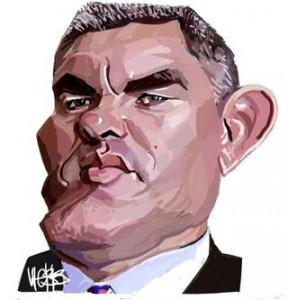THERE’S A MEMORABLE SCENE in “The Good Shepherd”, a movie about the early years of the Central Intelligence Agency (CIA). Matt Damon plays Edward Wilson (a character modelled on the real-life counter-spy James Jesus Angleton) and he is talking to Joseph Palmi, a Mafioso (played by the inimitable Joe Pesci) who asks him an interesting question.
Joseph Palmi: Let me ask you something ... we Italians, we got our families, and we got the church; the Irish, they have the homeland, Jews their tradition; even the [Blacks], they got their music. What about you people, Mr. Wilson, what do you have?
Edward Wilson: The United States of America. The rest of you are just visiting.
Sixteen years ago, “The Good Shepherd’s” screenwriter, Eric Roth, had his hero, Edward Wilson, give voice to a political idea that has only grown stronger among the sort of people who founded, and largely staffed, the CIA in the 1940s and 50s. Not the hyphenated Americans alluded to by Joseph Palmi, but the descendants of the original English and Scots-Irish settlers of the thirteen British colonies which, eventually, became the United States of America.
But, if the open expression of this idea was confined to the better sort of Republican country-club for most of the post-war era, it has – thanks to Donald Trump – escaped. Virtually everything that distinguishes Trumpian populism may be traced back to those two crucial questions: Who is a real American?, and, Who is “just visiting”? All of the hatred directed at ethnic minorities, women, and the gender divergent is explicable only when set in the context of the historical and constitutional expansion of who can be an American citizen.
Moreover, if American political commentator, Brynn Tannehill, posting on the US website, Dame is to be believed, the Edward Wilson understanding of who “owns” America, may, in just a few decades, be the unabashed conventional wisdom of the American Right. Tannehill quotes Larry Ellmers of the ultra-conservative Claremont Institute – with chilling effect.
According to Ellmers, few Americans are willing to accept that:
[M]ost people living in the United States today – certainly more than half – are not Americans in any meaningful sense of the term […..] They do not believe in, live by, or even like the principles, traditions, and ideals that until recently defined America as a nation and as a people. It is not obvious what we should call these citizen-aliens, these non-American Americans; but they are something else.
Inasmuch as most of the political trends and tropes of American politics tend to end up on these shores eventually – and, thanks to social-media, rather sooner these days than later – it would seem sensible to anticipate similar ethno-nationalist sentiments becoming a feature of New Zealand politics.
Fuelling such attitudes will be the sort of statements that got Kelvin Davis into hot water a few weeks ago. Annoyed by the political stance taken by Act MP and Wahine Māori, Karen Chhour, Davis accused her of viewing the world through a “vanilla lens”. Like Edward Wilson, Davis gave every appearance of regarding all those who followed the original inhabitants of Aotearoa as “just visiting”.
(It is worth noting, at this point, that Wilson’s creator, Roth, made no mention of Native Americans, the people who really were the continent’s first arrivals!)
Should the idea become widely accepted that those who share Davis’s opinions of late arrivals “do not believe in, live by, or even like the principles, traditions, and ideals that until recently defined [New Zealand] as a nation and as a people”, then the behaviour of ultra-conservative Pakeha will become every bit as provocative – and dangerous – as the behaviour of extreme Māori nationalists.
Because, of course, these otherwise antagonistic groups have two very important imperatives in common: both must be absolutely committed to gutting democracy and extinguishing liberty. How could they not be, when those who do not share their views of the world possess a great many more votes than they do?
Regardless of whether you’re defending the USA from citizen-aliens; guarding Aotearoa against insufficiently Māori Māori; or upholding the “principles, traditions, and ideals” that define New Zealand as a nation; the one thing you absolutely must be sure of is that the people who are “just visiting” your country, cannot impose their will upon those whose treasure it has been all along.
This essay was originally published in The Otago Daily Times and The Greymouth Star of Friday, 16 December 2022.










